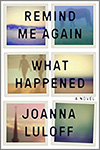Review — REMIND ME AGAIN WHAT HAPPENED by Joanna Luloff (Sri Lanka)
Remind Me Again What Happened
by Joanna Luloff (Sri Lanka 1996–98)
Algonquin Books
June 26, 2018
288 pages
$26.9 (paperback), $11.99 (Kindle)
Reviewed by Susi Wyss (Central African Republic 1990-92)
•
Most readers of Joanna Luloff’s latest work, Remind Me Again What Happened, won’t realize that she served as a Peace Corps Volunteer in Sri Lanka in the 1990s. There is no mention of this fact in her bio on the book’s jacket, and the novel takes place almost entirely in Vermont and Boston. But if the reader happens to be a fellow RPVC, they are likely to recognize the wanderlust, the irresistible urge to travel to far flung places, that afflicts one of the main characters, Claire.
Claire has had plenty of overseas adventures already. As a journalist, she’s been traveling around the world to investigate and write in-depth pieces about climate change and environmental conflicts among the people who are most affected by droughts and other climate-related events. But a mosquito in India infected her with Japanese encephalitis, causing high fevers, seizures, and damage to her central nervous system — and leaving her with no memories of her travels or her adult life, just “a smudge where my memories are supposed to be.”
Claire’s husband, Charlie, has brought her home to Vermont, where he works as the editor of the local newspaper, to take care of her. Calm and steady, a bit of a homebody, and greatly concerned about his wife’s health, his personality evokes the expression, “Opposites attract.” The task of caring for his restless wife is greatly aided by Rachel, Claire’s best friend, who has come from Boston to stay with them for an undefined period of time.
It’s not the first time that Claire, Charlie, and Rachel have lived in the same house. In their early 20s, they shared a home in Boston, referring to it as their “orphanage” because all three sets of parents were either deceased or estranged. Living under the same roof, their lives became permanently entangled — even, it seems, after Claire and Charlie got married and moved to Vermont.
It’s the classic setup of a triangle, which becomes even more complex when the reader learns there is more to Rachel’s history with Charlie than the fact that they both love Claire. Remind Me Again What Happened is told from the alternating points of view of Claire, Charlie and Rachel — providing the reader with the thoughts and feelings in all three corners of the triangle. Shifting points of view are often tricky, but Luloff pulls it off effortlessly; in fact, it’s hard to imagine the book written any other way. Without the intimate thoughts of each character, the novel wouldn’t be as emotionally rich as it is. Moreover, the multiple points of view foster the reader’s empathy for all three characters as they face their respective dilemmas. There is no right or wrong, no black or white. As with the best fiction — and as with real life — there are not easy pronouncements or solutions for this trio.
Luloff also uses photographs to great effect. Inserted between some of the text from Claire’s point of view, black and white pictures depict photographs she has taken and that she peruses in the hopes of jarring her memory. There are other photographs, too — on walls, on refrigerators, in old albums — that are described without being shown. These images seem to raise the question: how much do pictures aid our memories? How much do they capture what happened — and how much more do they leave out?
More importantly, Luloff’s book asks how much our memories form who we are. The answer seems to be: less than we tend to think — at least judging by Rachel’s observation of Claire. Despite Claire’s memory loss, Rachel notes: “She couldn’t see it but I could — she was still the same person she had always been. She might feel like a stranger in her own skin, but to me she was a continuation of who she’d always been — shimmering, fearless, proud, defiant Claire.”
Readers will be hard pressed not to feel pulled in by the interwoven predicaments of these three characters’ lives. Will Claire get well enough to travel again? Will she and Charlie deal with the changes in their relationship that occurred prior to her illness, even though she is only vaguely aware of them? Will Rachel tell Charlie about a secret she’s kept from him all these years that irreparably changed their lives a long time ago? And who is the mysterious Michael, a photographer in India who keeps resurfacing in the self-described “black hole” of Claire’s addled memory?
A desire for answers to questions like these will keep readers glued to the pages of Luloff’s novel, but it’s her deft and evocative prose that make the story of these three interwoven lives linger long after the book draws to an end.
“Charlie and I have always been better at communicating in silence or with other people’s words,” Rachel claims early in the novel. Fortunately for us, Luloff doesn’t have this problem.
•
Susi Wyss is the author of The Civilized World, a novel in stories set across Africa that received a Maria Thomas Fiction Award from Peace Corps Writers, and was named a “Book to Pick Up Now” by O, the Oprah Magazine. You can find her online at www.susiwyss.com.
No comments yet.
Add your comment